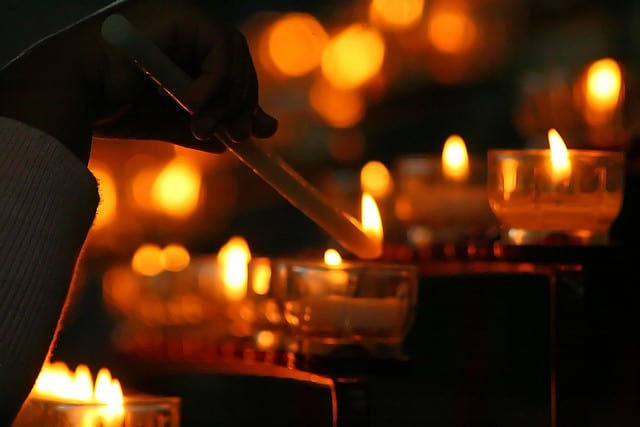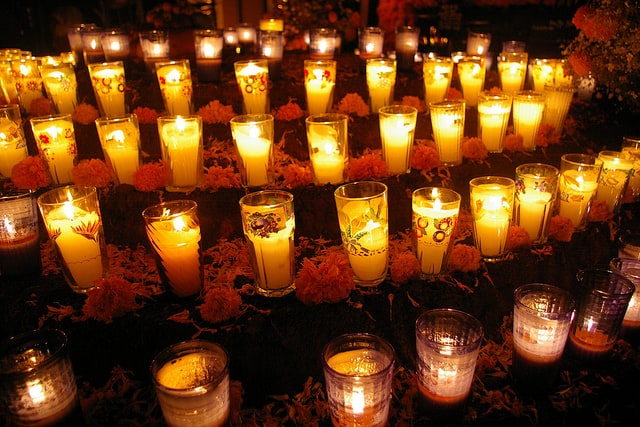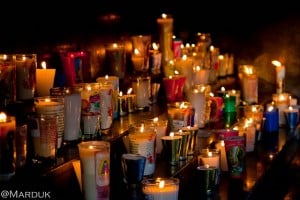There’s definitely a monopoly on candles in our society. You can buy the smell of anything nowadays and find it in any color wax. Just walk into any American household. Almost every suburban home is bound to have more than a few candles decorating every room. A blue ocean-scented candle for the bathroom, a green forest-scented candle for the living room, etc.
But let’s stop and ask ourselves: What is the meaning behind the candles that we light in our homes? Relaxation, romance, seasonal ambience — or maybe just to cover up a horrible smell? Is it simply to add style and class to our living rooms? Or can there be a deeper meaning behind these candles?
For me, the answer is yes. You see, I never grew up with scented candles, let alone the concept of candle decor. (This apparently is a thing.) My eldest sister first introduced me to candle decor when I moved to the suburbs with her at the age of eighteen. She used them as way to help create the “country chic” look that she was going for. It worked. Now her home looks like a barnyard café that Martha Stewart would frequent.
* * *
In stark contrast, I grew up with candles having a profound and spiritual meaning, a depth rooted in my Mexican culture. If you ever shop at a Mexican store, or stumble down the ”ethnic” aisle, you will most likely find a shelf filled with candles for sale. But these aren’t your usual Yankee Candles. When you see the shelf at first, you may think that it is a Christian shrine set up by a particularly devout store owner. Wrapped around the glass of each of these candles, you will see images of La Virgen de Guadalupe, Jesus on the cross, the Good Samaritan, and a host of other Catholic figures. The reason is simple: in Latino culture, candles are always used for prayer. To light a candle is to begin a conversation with God. To light a candle with the image of La Virgen de Guadalupe is to ask specifically for her intercession.
It’s a beautiful cultural tradition that my family instilled in me as a young Chicano. However, I never fully grasped the power and profound significance of this tradition until a Salvadoran woman truly taught it to me. It was a lesson in faith that I learned at the age of eleven.
On a late night in March 2001, I heard a gentle knock at my family’s apartment door. Being the only person in the living room, I got up to open it. As I slowly cracked the door open, I recognized our neighbor’s face: an indigenous Salvadoran woman, standing outside and peeking in. A look of sheer terror and desperation accompanied her swollen, red eyes.
“¿Sí?” I asked. Gathering the little strength she had, she quietly mumbled, “¿Tienes una vela…?” Do you have a candle…? At that moment, my mom rushed out of her room toward the door. Although I was confused, my mom seemed to know exactly what was going on; she had the same look of terror on her face. As my mom stood next to me, the Salvadoran woman turned to her. She repeated, “¿Tienes una vela…?” But this time, she was able to finish her sentence, “…mataron a mi hijo.”
They killed my son.
In panic, my mom ran to her room saying “Oh mi Dios, Oh mi Dios” under her breath while making the sign of the cross. In a few seconds, she came back out with a candle in hand, one with la Virgen de Guadalupe on it. Mamá stepped outside of our apartment and held our neighbor in her arms. The Salvadoran woman began weeping hysterically as she lost the strength in her legs to stand. My mom held her up with all of her compassion, while clutching onto the candle. Through her tears, my mom whispered to her: “Vamos a rezar. Vamos a rezar.”
We’re going to pray.
The Salvadoran woman’s son was a Los Angeles gang member, murdered that night by a rival gang. He was her eldest son. Having first heard the gunshots — and then the police report of her son’s death– she knew that she would never see him again. Yet upon learning that her son was another Latino victim of gang violence, the one thing she wanted was a candle. In her desperation, she came to my family for a vela. To her, this candle represented hope at a time when her faith had been damaged by the news of her son’s death. This candle was what she needed to start a conversation with God.
In this moment of despair and darkness she sought to talk directly to God. None of this violence made sense. None of this pain had reason. Couldn’t You have prevented this? My son has been murdered, how can I ever trust you again? These difficult questions could have damaged her relationship with God. She could have ended the conversation there and moved away from her faith forever.
And yet, she did the opposite…she chose to draw closer to God. By lighting this vela, my Salvadoran neighbor was not only seeking to ask these questions; she was also faithfully awaiting to hear God’s response. She knew, deep down inside, that God was there with her, listening to her. Like the flame atop the wick, God was a flickering light of hope in the midst of this darkness.
Hers was not a conversation of anger and resentment; it was the first step on a journey toward healing. She would meet God in her brokenness and God would meet her in His love. She did not hope to immediately understand this gratuitous death through her prayer. Instead, she only sought to be heard, comforted and loved. She sought the strength to be carried through the darkness as her body and soul lost strength. My neighbor sought to find God in a moment when she couldn’t feel anything…and she did find God. That night, the Salvadoran woman was carried and comforted by her neighbor, my mom. My mamá held her in her arms while they prayed in front of the burning candle for hours. Through the faith of these two women, God’s love shone brightly within the darkest of suffering.
***
What is the meaning behind the candles that we light in our homes? It’s incredible to think that they can be more than just scented decorations for a living room. A candle can be a powerful tool for finding God in the midst of our greatest tragedies. It can be the start of a conversation with God, the start of our healing. Every time I see a vela, I see a means for connecting with the divine; every time I light a candle, I feel an urge to pray.
And whenever the flames dance atop the candles on my prayer altar, the image of the weeping Salvadoran woman comes to my mind. I recall again the events from that night in March. I inevitably make the sign of the cross, as the words my mother spoke that night rise up in my heart:
“Vamos a rezar.”




